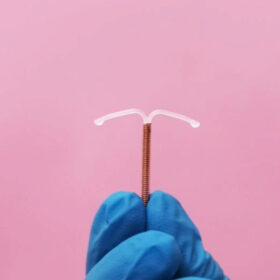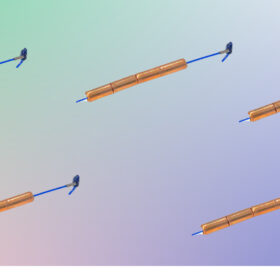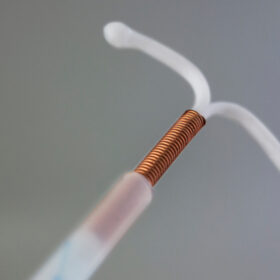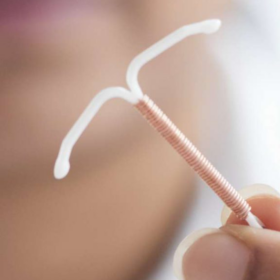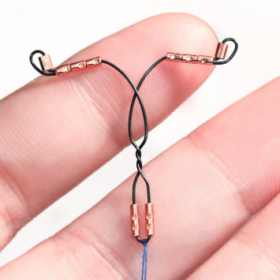
IUD brands
In this article
What's the lowdown?
IUD stands for intrauterine device
It is a small plastic device inserted into the uterus, lasting between 3-12 years
There are 2 types: progestin-releasing (hormonal) or copper (non-hormonal)
The world of birth control can be tricky. The brands, the uses, and the side effects can all blur into one. Let’s focus on IUD brands today and get to know them a little better.
A quick history lesson before we get started. The first IUD was invented by a German doctor in 19091 which was made of silkworm gut! WoW!
What is an IUD
An intrauterine device or IUD2 for short is a small T-shaped device that sits in your uterus, acting as a birth control type called long-acting reversible contraception (LARC). According to the Centre for Disease Control, 10.4% of women in the USA aged 15-49 use LARCs3.
There are 2 options: hormone-releasing device or copper device.
Hormonal intrauterine devices:
Copper intrauterine device:
How does an IUD work
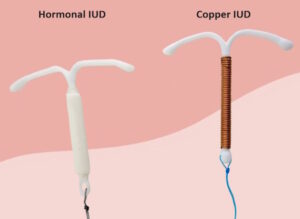
The Kyleena, Liletta and Mirena IUDs release the hormone progestin, a synthetic version of progesterone. Progesterone is a naturally occurring hormone in our body. This prevents pregnancy in 2 ways:
- Thickening the cervical mucus, creating a tricky barrier for the sperm to enter the uterus
- Thinning out the lining of the womb so a fertilised egg can’t implant and grow into a pregnancy
In some people, hormonal IUDs also prevent ovulation (ovary releasing an egg) so no egg = no baby.
The Paragard IUD contains copper. Copper creates a toxic environment for sperm affecting the way they swim in4. So it makes it harder for the sperm to reach the egg, reducing chances of fertilization.
| Kyleena | Liletta | Mirena | Skyla | Paragard | |
| Type | Progestin-releasing | Progestin-releasing | Progestin-releasing | Progestin-releasing | Copper |
| Hormone dose in total | 19.5mg | 52mg | 52mg | 13.5mg | N/A |
| Duration | 5 years | 8 years | 8 years | 3 years | 12 years |
| Effectiveness5 | 99% | 99% | 99% | 99% | 99% |
Crazy to think how such a small device can prevent 99 out of 100 pregnancies.
IUD brand side effects
Kyleena
Frequent side effects of Kyleena6 are:
- Headaches/Migraines
- Tummy pain (abdominal and pelvic)
- Greasy skin
- Changes to your period flow
- Spotting
- Irregular periods
- Absent periods (Amenorrhoea)
- Ovarian Cysts
- Low mood/Depression
- Inflammation to the external genitalia (vulvovaginitis)
- Nausea
- Upper genital tract infection
- Breast pain/tenderness
- Expulsion of the IUD
- Vaginal discharge
- Pain and spotting on insertion
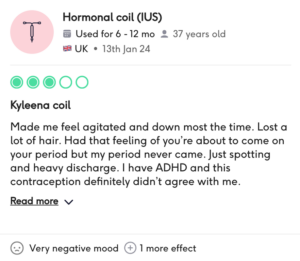
Liletta
Frequent side effects of Liletta7 are:
- Headaches/Migraines
- Tummy pain (abdominal and pelvic)
- Acne
- Painful periods (dysmenorrhoea)
- Spotting
- Irregular periods
- Absent periods (Amenorrhoea)
- Low mood/Depression
- Anxiety
- Painful sexual intercourse (dyspareunia)
- Breast pain/tenderness
- Vaginal discharge
- Vaginal infections
- Pain and spotting on insertion
Mirena
Frequent side effects of Mirena8 are:
- Headaches/Migraines
- Tummy pain (abdominal and pelvic)
- Acne
- Changes to your period flow
- Spotting
- Irregular periods
- Absent periods (Amenorrhoea)
- Ovarian Cysts
- Low mood/Depression
- Inflammation to the external genitalia (vulvovaginitis)
- Nausea
- Upper genital tract infection
- Breast pain/tenderness
- Expulsion of the IUD
- Vaginal discharge
- Back pain
- Excessive hair growth on the body (Hirsutism)
- Painful periods (dysmenorrhoea)
- Pain and spotting on insertion

Skyla
Frequent side effects of Skyla9 are:
- Headache/Migraine
- Tummy pain (abdominal and pelvic)
- Acne
- Irregular periods
- Absent periods (Amenorrhoea)
- Ovarian Cysts
- Low mood/Depression
- Inflammation to the external genitalia (vulvovaginitis)
- Nausea
- Breast pain/tenderness
- Expulsion of the IUD
- Vaginal discharge
- Vaginal infection
- Back pain
- Puffiness in your hands, feet, and face
- Weight gain
- Pain and spotting on insertion
Paragard
Frequent side effects of Paragard10 are:
- Expulsion of the IUD
- Painful sexual intercourse (dyspareunia)
- Spotting
- Heavier periods
- Longer period lengths
- Low iron count (anemia) due to longer and heavier periods
- Painful periods (dysmenorrhoea)
- Vaginal discharge
- Back pain
- Tummy pain (abdominal and pelvic)
Benefits of IUDs:
- Don’t rely on your remembering them
- Don’t affect your fertility
- Are super effective
- Can be used as emergency birth control (more effective than Plan B!)
- Make periods more manageable
As they are inserted into the uterus, there is no need to remember to take something daily. It is hassle-free and works 24/7 to prevent pregnancies. Yes, the IUDs last for a long time, especially the Paragard but they are not permanent, phew. So you can get them inserted and forget about it. When you’re ready to start family planning, simply get it removed and your reproductive system will be ready to go! IUDs do not affect your long term fertility at all. The hormonal IUDs can lighten or stop periods. So, on top of being a LARC they can also make your periods more manageable.
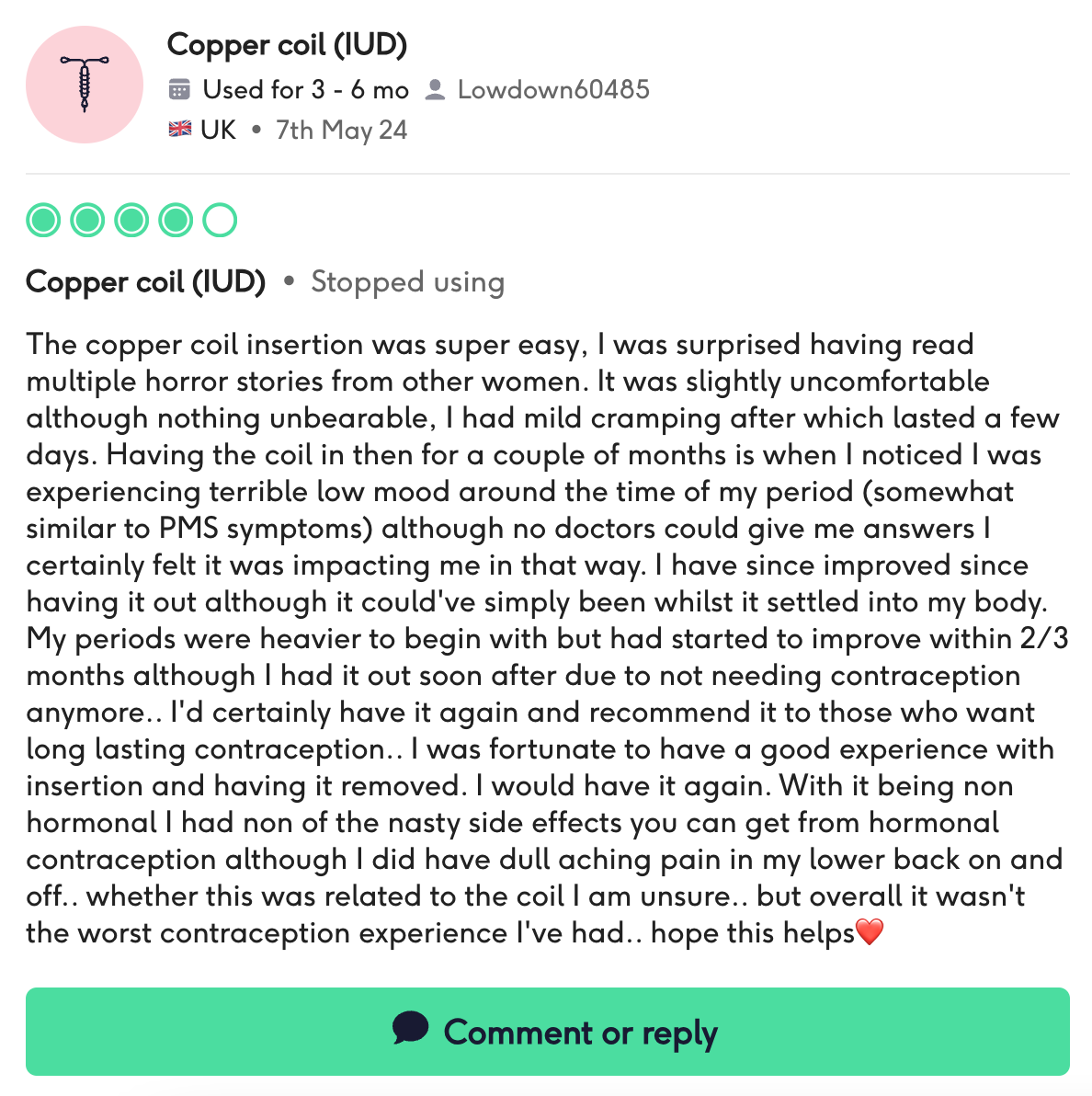
IUDs including the Paragard, Mirena, and Liletta are also licensed be used as emergency birth control in the US. If you’ve had sex without protection and want to prevent a potential pregnancy, you can choose these IUDs as long as it is within 120 hours or 5 days of unprotected sex. Once it’s inserted, it is 99% effective at stopping pregnancy and you can then keep using it as birth control long term.
So how do I choose?
There are many options in the sea of birth control. Trying to narrow down what is right for you might seem like a mission. First, start by doing some preliminary research and deciding on the benefits you want from your choice. If you have some options you’re trying to narrow down, our birth control comparison tool will make things easier for you. If you have no idea where to start, use our birth control recommender quiz to find your perfect match.
Your personal experience of birth control could make a huge difference in someone’s birth control choice, so why not share?
Our medical review process
This article has been medically reviewed for factual and up to date information by a Lowdown doctor.


